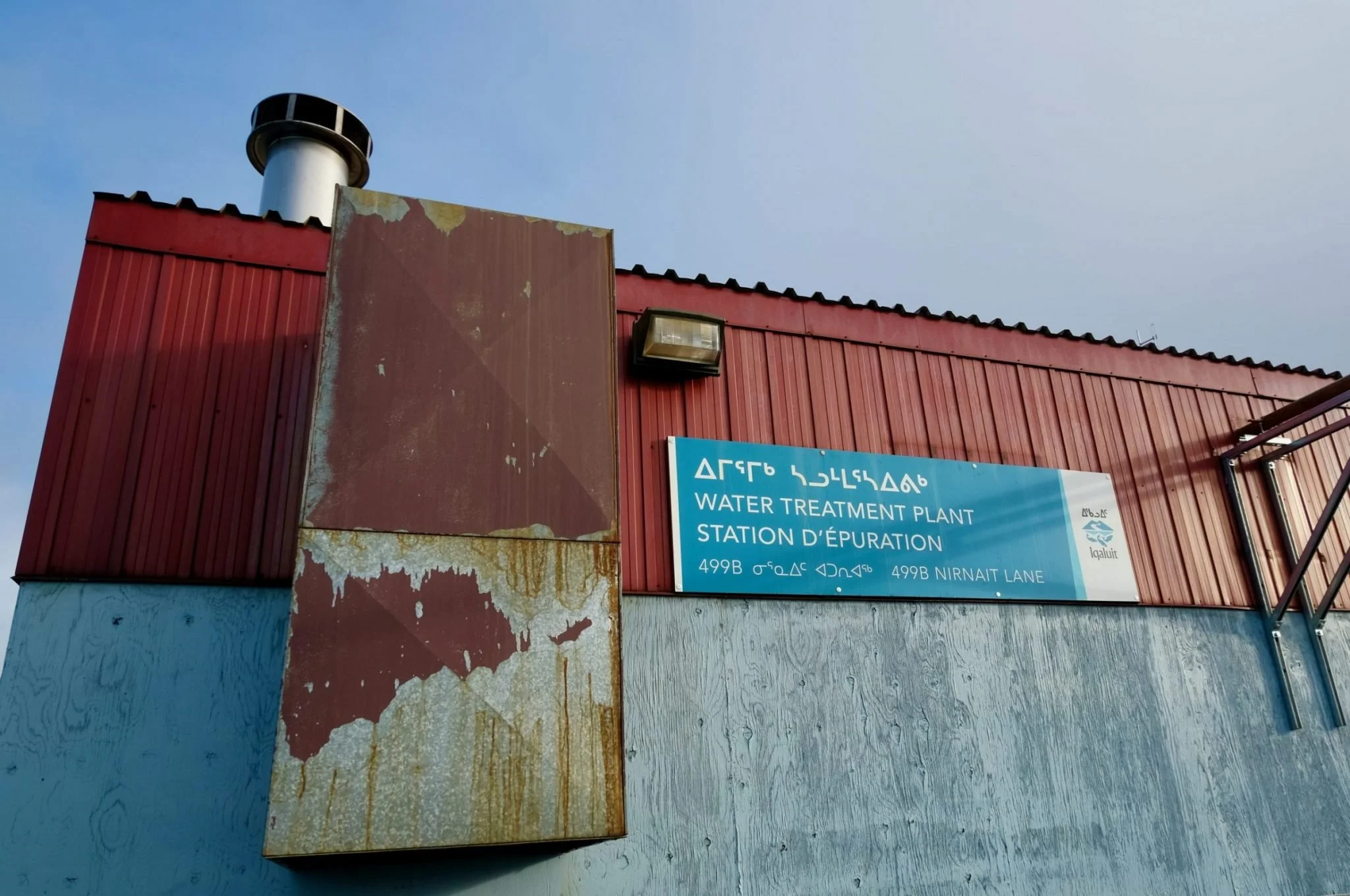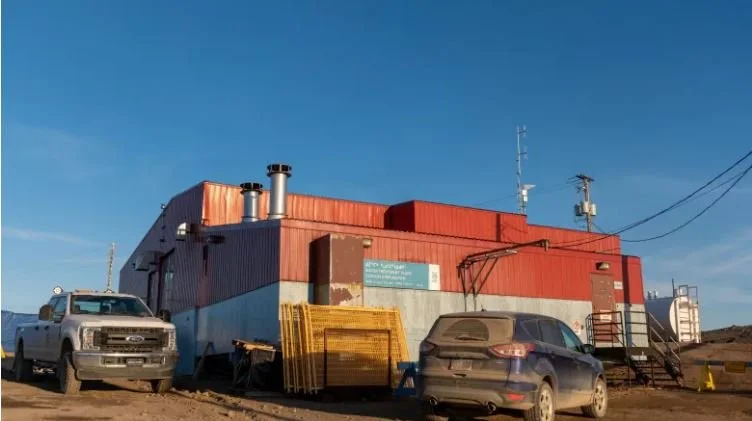The City of Iqaluit says it lost between six and 10 million litres of water over the past three days as crews worked to address problems with its piped water system. The city shut down all water services on Saturday while crews repaired the water line near the Astro Hill complex where a major leak had been reported early that morning. Water was restored for most of the city by Saturday night, while a medical boarding home was hooked back up to the system by Sunday afternoon.
Nunavut declares state of emergency over Iqaluit water shortage
The Nunavut government has declared a two-week state of emergency over a water shortage in Iqaluit. Joanna Quassa, the acting minister of community and government services, said Friday that it's meant to ensure the city can get necessary regulatory approvals to immediately begin replenishing its reservoir. "We are committed to working with the City of Iqaluit to ensure water levels will meet the needs of the residents of Iqaluit through the upcoming winter," Quassa said in a statement.
City of Iqaluit to pay $800K to clean contaminated underground water tanks
The City of Iqaluit has awarded Tower Arctic Ltd. an $800,000 contract to clean three contaminated underground water tanks at the city’s water treatment plant. City councillors voted unanimously during Tuesday’s council meeting to hire the company to remediate the North and South Clear wells and the mixing chamber at the plant. The tanks were contaminated by fuel last fall and winter. Tower Arctic Ltd. had the lowest of three bids, the highest coming in at nearly $6 million.
Iqaluit lifts boil water advisory after 4 days
People in Iqaluit can drink the tap water again, after being advised Friday the water was unsafe due to a "mechanical failure." That's according to a Monday public service announcement from the City of Iqaluit. No further details were offered on the nature of the mechanical failure that led to the advisory. The advisory was at least the third one this year, coming two months after one that stemmed from repairs to a water valve. Before that, the city issued a boil water advisory in January after it detected fuel in its water supply.
'We took a lot of heat': Emails show how city, Nunavut handled Iqaluit water crisis
Emails between the City of Iqaluit and Nunavut Health department staff show there was a debate over how to respond to the capital's water emergency last year. Some 8,000 Iqaluit residents couldn't drink tap water for nearly two months after it was found to be contaminated with fuel. Trace amounts of fuel were also found in January when residents again reported smelling it in the water.
How did fuel enter water?
Iqaluit resident Jenny Ell says she couldn't believe it when she turned on her tap a couple of weeks ago and smelled fuel for the second time in a matter of months. Ell, who is pregnant, said she was worried for her baby's safety and immediately contacted the city. "I'm hanging in there," Ell said. "Hopefully they're not slow about it like the last time it happened." About 8,000 people in the territory's capital city couldn't drink the tap water for two months last fall when it was found to be contaminated with fuel.
Fuel contamination concerns continue to cloud Iqaluit’s drinking water. Here’s why
The small city of Iqaluit is facing a water challenge again after traces of fuel were found in the Nunavut capital’s drinking water last week. A precautionary boil water advisory issued Wednesday is in place and the city has shut down its water treatment plant because a breach in the system is suspected to have caused Iqaluit residents to smell fuel in their water.
City sets up water station after fuel smell returns to Iqaluit’s water
The City of Iqaluit is distributing water from Sylvia Grinnell River Monday in response to complaints that the smell of fuel has returned to the city’s treated water. The water depot will be open from 3 to 8 p.m. at the Elders Qammaq, according to a news release issued by recreation director Stephanie Clark. The city is asking residents bring refillable containers, and to boil the water before drinking it or cooking with it.
Nunavut government confirms fuel found in Iqaluit water supply again
The Nunavut government has confirmed that traces of fuel have been found in Iqaluit's water supply, again. Danarae Sommerville, a spokesperson for the territory's Department of Health, stated in a media release that there "were levels of fuel oil that entered the system." However, the release adds that levels are below Health Canada's drinking water values. Even so, a do-not-consume order has not been issued.
Iqaluit says trace amounts of fuel found in drinking water again
The City of Iqaluit says trace amounts of fuel have been detected in the Nunavut capital’s water supply. The city says an initial review of data from its real-time monitoring station indicates fuel entered the water on Monday and Wednesday. It says there have been no measurements above low-alarm thresholds, but the city is proactively opening distribution valves to flush the water. The city had already confirmed it was investigating after residents complained they could smell fuel in their tap water again.
Maintenance led to new water tank contamination, City of Iqaluit says
The City of Iqaluit’s new water quality monitoring station detected measurable amounts of hydrocarbons in one of the city’s treated water tanks on Dec. 16, six days after the Government of Nunavut lifted its do-not-drink order. The city disclosed the incident in a Thursday news release that also outlines its work to ensure municipal water is safe to drink, following an eight-week emergency caused by fuel contamination of the water supply.
Iqaluit faced COVID-19, contaminated water and reconciliation in 2021
After about a week of reports in Iqaluit that the city’s water smelled of fuel, and the City of Iqaluit reassuring them it was safe to drink, further testing detected hydrocarbons and led to a two-month state of emergency. As the story developed over two months and national media outlets broadcast clips from Iqaluit, a patchwork system of supports started to materialize. The city and the Government of Nunavut flew bottled water up to the community, monopolizing a big portion of cargo space on incoming flights. Cargo employees worked overtime to offload the large shipments, while volunteers handed it out at pick-up stations and delivered it to homes.
Nunavut's former deputy chief public health officer spills details on Iqaluit's water crisis
Nunavut's former deputy chief public health officer says she flagged concerns to the City of Iqaluit about whether tests at the city's water facilities were done properly in early October when strange, fuel-like smells were coming from the taps. In an interview with CBC News, Dr. Anne Huang, who is no longer in the role, said that "It definitely was challenging to receive information that first week." Initially, she said the city "had no idea who I was." In the days that followed, her fears were realized when she found that initial water samples sent to an Ottawa lab had not been collected correctly.
Iqalummiut get a break on November water bills
Iqalummiut will not have to pay their water bills for the month of November as city councillors voted in favour of providing a 100 per cent rebate due to the water emergency. The move will cost the City of Iqaluit approximately $1.7 million, money council hopes the Government of Nunavut will cover. The Government of Nunavut had imposed a do-not-consume water advisory from Oct. 12 to Dec. 10 due to fuel contamination in the city’s water supply.
City recreation staff no longer assigned to water emergency
The City of Iqaluit’s recreation staff are back at the Iqaluit Aquatic Centre and the gym is open after they were reassigned on Dec. 1 to help with the water emergency. It remains unclear when the city will make other moves to return to normalcy, following a water emergency that lasted nearly two months, caused by the discovery of diesel fuel in the city’s water system. During that time, Iqalummiut were under a do-not-consume water advisory due to fuel contamination. On Dec. 10, the Government of Nunavut lifted that advisory.
Iqaluit residents can drink tap water again, Nunavut's health department says
Nunavut's Department of Health lifted the do-not-consume order in Iqaluit, meaning residents there can once again drink from the city's water supply. Iqaluit's 8,000 residents have spent the last two months unable to drink the city's water from their taps due to concerns about fuel contamination. Officials originally told residents not to drink the tap water on Oct. 12, after complaints started flooding in about a smell of fuel in the water. In a news release Friday afternoon, Chief Public Health Officer Dr. Michael Patterson stated that all tests done after Oct. 19 have shown the drinking water is safe to consume.
Military resumes purifying river water in Iqaluit as city searches for solution to plastic bottle waste
Two weeks after a winter storm in Iqaluit took down the tent that housed the Canadian Armed Forces' water purification system, their efforts to provide the city with clean drinking water have resumed. On Monday, the City of Iqaluit announced residents can get purified river water from the military's purification system at Abe Okpik Hall or Elder's Qammaq, but they have to bring their own buckets or jugs — the water depots are no longer providing bottled water.
Nunavut sees 5-year high for water advisories in 2021
Nunavut communities have seen a five-year high of water advisories in 2021, without counting Iqaluit’s ongoing water emergency. As of Friday, about a month before the year’s end, 14 water advisories had been issued in seven communities outside of the capital city this year, more than tripling the four advisories issued in 2017. Nunavut’s MP Lori Idlout spoke about the lack of clean water in Indigenous communities across Canada on Thursday. “We Indigenous people can no longer be discounted or written off in hopes that we disappear,” she said in Inuktitut in the House of Commons. “I know I have to keep repeating ‘clean water for all indigenous communities,'” Idlout said. “This is not the first time and I will repeat it again.”
'We're all tired': Iqaluit residents unable to drink tap water for nearly 2 months
In the summer, the Sylvia Grinnell River near Iqaluit is a popular spot to fish for Arctic char where ice-cold water cascades over rocky ledges. Now, with thick layers of ice and snow covering the flowing water below, it has become one of the city's main water sources for drinking and cooking. The other comes in thousands of plastic water bottles that arrive by plane.
City of Iqaluit Looks for Workers to Help with Water Distribution
The City of Iqaluit, Canada is hiring temporary workers to help with water distribution as its water emergency enters its seventh week, according to Nunatsiaq News. The city’s water emergency began in October, when people began complaining of a fuel-like smell in their tap water. On 12 October, the city reported fuel, later confirmed to be diesel fuel, had contaminated its water treatment plant. The city and Government of Nunavut declared states of emergency later that day that are still in effect. Volunteers played a significant role in water distribution earlier during the emergency, but support has since waned.



















